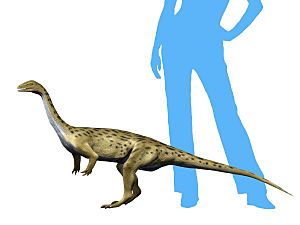Saturnalia (dinosaur) facts for kids
Quick facts for kids Saturnalia (dinosaur) |
|
|---|---|
 |
|
| Life restoration | |
| Scientific classification | |
| Genus: |
Saturnalia
|
| Species: |
tupiniquim
|
Saturnalia is an extinct genus of basal prosauropod dinosaur from the Triassic of Rio Grande do Sul, southern Brazil. The deposits are dated to the early Upper Triassic, about 225 million years ago (mya). The dinsaur grew to about 1.5 meters (5 ft) long.
Phylogeny
The primitive nature of Saturnalia, and its mixture of sauropodomorph and theropod characteristics, has made it difficult to classify.
The first (1999) description of the genus assigned it to the Sauropodomorpha. However, in a 2003 paper, Langer noted that features of its skull and hand were more similar to the sister group of sauropodomorphs, the theropods, and that Saturnalia could be considered a member of the sauropodomorph "stem-lineage", rather than a true member of that group.
José Bonaparte and colleagues, in a 2007 study, found Saturnalia to be very similar to the primitive saurischian Guaibasaurus. Bonaparte placed the two in the same family, Guaibasauridae. Like Langer, Bonaparte found that these forms may have been primitive sauropodomorphs, or an assemblage of forms close to the common ancestor of the sauropodomorphs and theropods. Overall, Bonaparte found that both Saturnalia and Guaibasaurus were more theropod-like than prosauropod-like. However, all more recent cladistic analyses found it to be a very basal sauropodomorph,
Images for kids
See also
 In Spanish: Saturnalia tupiniquim para niños
In Spanish: Saturnalia tupiniquim para niños


